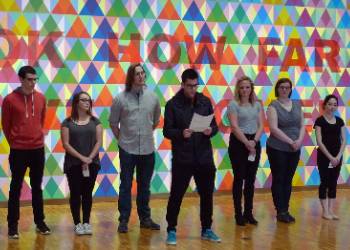101 MWF 12:00-12:50 Professor Ibtisam Abujad
Course Title: Books That Matter: Migrant Literature: Global Migration Politics, in our Own Words
Course Description: In this class, we will examine migration politics through the activist literature of migrant writers and cultural producers. We will think about how twenty-first century experiences of migration-- the crossing of borders and ideological boundaries-- are informed by political, social, and economic contexts. This will help us critically examine how these experiences are impacted by colonial histories of dispossession and displacement and the contemporary global flows of power. We will read novels and non-fiction essays that resist assimilation and marginalization, also engaging with visual texts and articles that help us examine race, religion, gender, and class in these complex experiences of migration.
Readings: Texts include Samira Ahmed’s Internment, Ibi Zoboi's American Street, and Neema Shah’s Kololo Hills, stories by Karla Cornejo Villavicencio, and essays, film, and sonic texts that facilitate critical thought
Assignments: engagement and active participation in class discussions and critical and creative activities, short responses, two think pieces, and your own research-based activism project
102 MW 2:00-3:15 Professor James Pribek, SJ
103 TuTh 3:30-4:45 Professor Holly Burgess
Course Title: African American Youth Culture and Literature
Course Description: Tupac Shakur stated, “I’m not saying I’m gonna rule the world or change the world, but I guarantee that I will spark the brain that will change the world." This course will study poetry, novels, and music written by 20th and 21st century African American writers. We will explore how African American youth culture and activism influence literature and music. This course will discuss how hip-hop artists like Tupac Shakur and his musical contemporaries influence the current generation of Black activists and artists in The Black Lives Matter Movement.
We will study how African American authors utilize young adult literature and science fiction to examine race, gender, sexuality, trauma, grief, and violence. As we read, we will consider: how literature and music reflect reality, how Black writers use literature to teach Black history and cultural memory, and how authors utilize their writing as an act of social protest. This course will also engage in the current scholarly discussions on police brutality, book banning, and making space for joy when trauma is ever-present.
Readings: Tiffany D. Jackson’s Let Me Hear a Rhyme, Janelle Monáe’s The Memory Librarian: And Other Stories of Dirty Computer, Tupac Shakur’s The Rose That Grew from Concrete, and Angie Thomas’s The Hate U Give.
Assignments: Online discussion posts, short writing assignments, and a reading journal
104 TuTh 12:30-1:45 Professor Susan Jones-Landwer
Course Title: Books that Matter: Women's Protest History in the United States
Course Description: This course will be guided by the questions - how has women's protest literature changed in the United States, and how has it remained the same? In this class, we will explore protest literature beginning in the early 19th century through the 21st century that surveys speeches, lectures, and other published works. We will take a look at the context to which each literary artifact is delivered, how each protest artifact is organized, and why that particular artifact was used to institute change.
Readings: American Protest Literature, Narrative in the Life of Nancy Prince, Woman Suffrage and Politics: The Inner Story of the Suffrage Movement, and The Purity Myth. List not all inclusive and will include multiple short readings on D2L.
Assignments: Several short writing assignments; a reading journal; and participation.



